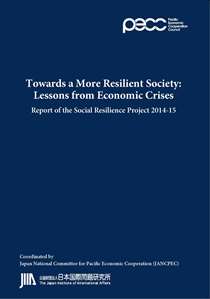 ISBN 978-4-8193-0213-5
ISBN 978-4-8193-0213-5
154 pages
The Japan Institute of International Affairs (JIIA)
Table of Content
1. Inclusive growth and social security (Nobuhide Hatasa)
2. Migrant workers and social protection: The Philippine experience (Aniceto C. Orbeta, Jr.)
3. Thailand: Social resilience in a divided society (Yasuhito Asami)
4. Social protection and the informal economy in Malaysia (Jun-E Tan)
5. Social security system: The Korean case (Sook Hee Choi and Mikyung Yun)
6. Challenges and reforms of social security system due to ageing population in Chinese Taipei (Ke-Jeng Lan)
Foreword
A series of regional and global financial crises highlighted the need to enhance the resilience of social infrastructure against sudden shocks, particularly for those categorized as vulnerable groups. More recently, a persistent and widening social divide that casts a shadow on the stability of national and global systems presents a serious challenge, and more social policies need to be developed to mitigate this gap.
In response to these challenges within the Asia-Pacific regional context, the Japan National Committee for Pacific Economic Cooperation (JANCPEC) has been conducting the Social Resilience Research Project (SR Project) as a Pacific Economic Cooperation Council (PECC) International Project since 2010. The SR Project aims to shed light on the importance of social security and to closely examine its role in the domestic economy. In addition, the SR Project is the first ambitious attempt by the APEC/PECC family to discuss social policy dimensions, as APEC and PECC have traditionally focused on trade and investment liberalization issues.
The first and second SR Projects have a four-fold focus: pension, health insurance, unemployment insurance, and macro-analysis. The first final report, entitled “Towards a More Resilient Society: Lessons from Economic Crises,” was published in October 2010, and the second final report was published in March 2012. Since 2012, we have attempted to conduct a case study of each Asia-Pacific economy. As the economic and social circumstances in each economy of this region are significantly different, a bottom-up approach is needed to identify the issues and challenges for the future development and
reform of social security systems.
In this report, the SR Project 2014-2015 covers the Philippines, Thailand, Malaysia, Korea and Chinese Taipei. The studies focus on specific issues in these economies, such as coverage for informal workers, social security for migrant workers and the sustainability of social security systems in aging societies.
The views expressed herein are the personal views of the individuals indicated, and do not necessarily reflect the views of PECC and The Japan Institute of International Affairs (JIIA). I hope that these inputs will prove useful in showing the way toward resilient societies and sharing best practices among member economies.
July 2016
Yoshiji Nogami
Chair, JANCPEC
President, The Japan Institute of International Affairs
